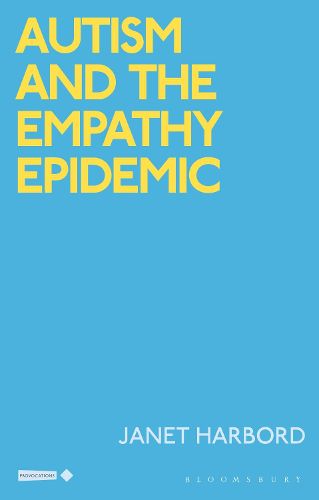Readings Newsletter
Become a Readings Member to make your shopping experience even easier.
Sign in or sign up for free!
You’re not far away from qualifying for FREE standard shipping within Australia
You’ve qualified for FREE standard shipping within Australia
The cart is loading…






Threading an enquiry through debates in neurodiversity scholarship and disability studies as well as film theory, this open access book challenges the widespread idea that autism is an epidemic characterised predominantly by a deficit of empathy, arguing that the reverse is true: we are living through an empathy epidemic in which autism is the outcast.
In 1908, the British psychologist, Edward Titchener, translated the German term Einfuehlung into the English language as 'empathy', around the same the time that Eugen Bleuler coined the term 'autism' for a group of symptoms subset to an emerging classification of schizophrenia. Empathy became a useful tool to describe relations between people in a clinical context, but in the process of its incorporation into psychology, it shed its rich sensory meaning from Einfuehlung as 'feeling-into' weather systems, architectural forms, and artworks. A remarkable reversal takes place in the first part of the twentieth century whereby empathy becomes an intra-human ethical act, and autism emerges as its inverse. Digging up and examining the buried relation between autism with an earlier form of 'empathy', this book argues that autism, like cinema, models an ethical apprehension of the more-than-human world.
The eBook editions of this book are available open access under a CC BY-NC-ND 4.0 licence on bloomsburycollections.com. Open access was funded by The Wellcome Trust.
$9.00 standard shipping within Australia
FREE standard shipping within Australia for orders over $100.00
Express & International shipping calculated at checkout
Threading an enquiry through debates in neurodiversity scholarship and disability studies as well as film theory, this open access book challenges the widespread idea that autism is an epidemic characterised predominantly by a deficit of empathy, arguing that the reverse is true: we are living through an empathy epidemic in which autism is the outcast.
In 1908, the British psychologist, Edward Titchener, translated the German term Einfuehlung into the English language as 'empathy', around the same the time that Eugen Bleuler coined the term 'autism' for a group of symptoms subset to an emerging classification of schizophrenia. Empathy became a useful tool to describe relations between people in a clinical context, but in the process of its incorporation into psychology, it shed its rich sensory meaning from Einfuehlung as 'feeling-into' weather systems, architectural forms, and artworks. A remarkable reversal takes place in the first part of the twentieth century whereby empathy becomes an intra-human ethical act, and autism emerges as its inverse. Digging up and examining the buried relation between autism with an earlier form of 'empathy', this book argues that autism, like cinema, models an ethical apprehension of the more-than-human world.
The eBook editions of this book are available open access under a CC BY-NC-ND 4.0 licence on bloomsburycollections.com. Open access was funded by The Wellcome Trust.